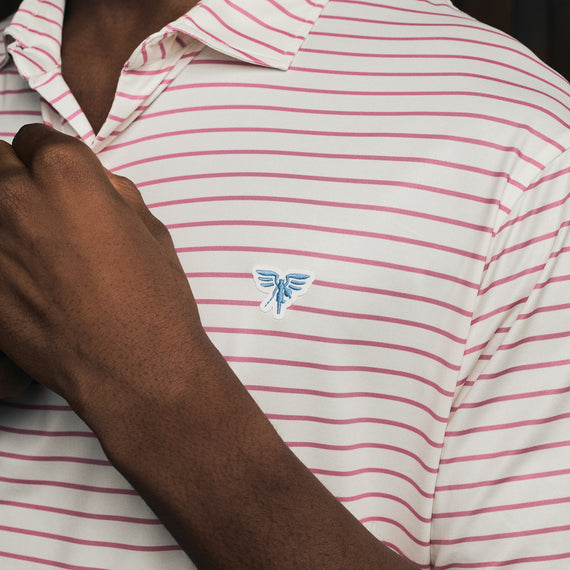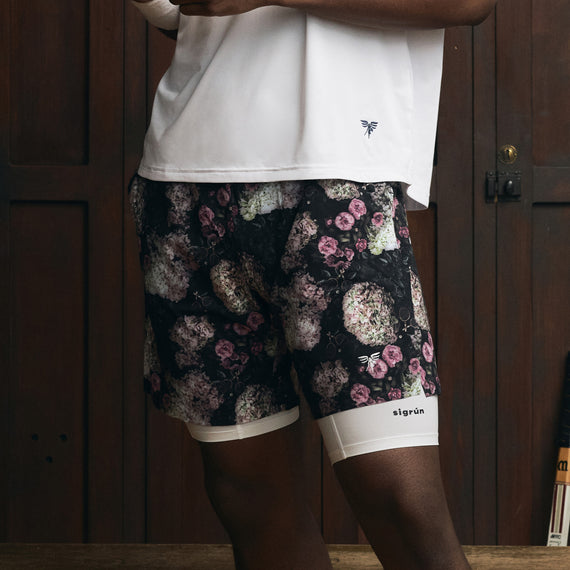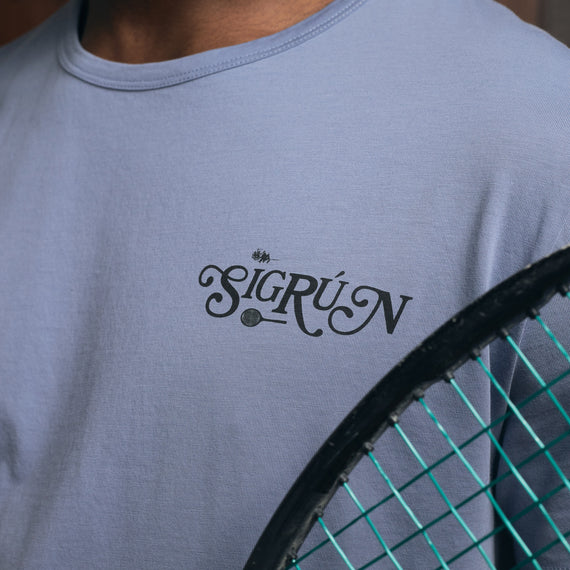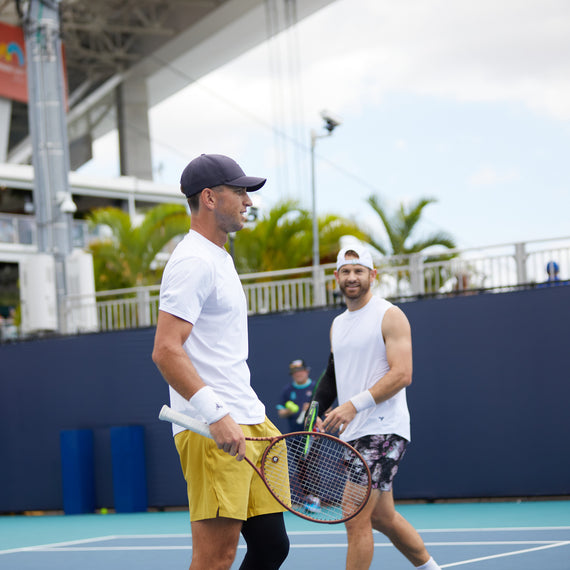Father's Day with Phil Farmer, legendary ATP coach and new father
With Father’s Day around the corner, we sat down with legendary ATP coach, and recent father, Phil Farmer, whose first son, Finn, was born on February 6 of this year. Phil has coached the likes of the Bryan brothers, Sam Querrey, John Isner, and many more, including most recently (after recording this interview), the 2023 French Open doubles champ Austin Krajicek and now the world #1 doubles player. He talked to us about coaching, his career, being a dad, and juggling the responsibilities of the ATP tour with fatherhood.

Can you describe your tennis career, what you do, and how you got to where you are now?
Yeah, so basically started playing tennis in Plano, Texas near Dallas at six years old, at the local country club there. Played in Texas juniors, played in high school, and just kind of fell in love with the game. At the age of 12, I got real serious about it. Ended up playing college at University of Oklahoma and that was a really good experience. Playing division 1 college tennis and being on a collegiate team and getting to experience the college life at OU, which is such a great school, was a great experience. Met so many great friends who are still friends to this day. All over the world, Australia, South Africa, Norway, England. It was awesome. That was a great experience and really fed the hunger in me of wanting to play professional tennis myself.
So when I graduated in 1996, I moved to Houston to work with my coach there, Keith Christman. He had a couple pro players there. I started training and playing the lower level pro tournaments, which used to be called Satellites. I did that for about a year and realized quickly how deep and competitive it was, especially internationally. I had the passion, work effort and desire, but I just didn’t… I felt like I had the eye for it, to understand, strategize, I could see it, but didn’t necessarily have the level to stay out there and sustain it. So then got into coaching from being around Keith who was working with different pros at the time – guys like Tommy Ho and Tara Snyder, an up and coming player who I was actually dating at the time. Ended up being around them and helping out, traveling with them. That’s kind of how I got in the arena and got the taste of traveling and coaching full time and I absolutely loved it. I felt like I had a gift for it and a desire, passion, and so I stayed with it.
And from there like anything else, I met people at the USTA, different organizations, different players, coaches, contacts, I just stayed with it. That’s how I got introduced to being a pro coach.
I think a lot of people are familiar with high level coaching, at clubs, or on a local level, but not so much on the ATP level. Can you talk about bridging that gap? How does one actually become a coach on the ATP or WTA tour?
Sure. Like a lot of things in business or in life, I think it’s about connections and relationships. Everyone’s got their background, coaching background, playing backgrounds, and so everyone’s got a little bit different … it’s just like playing styles … their own little personality and style. And so I think it’s really important if you’re trying to be a coach on the tour, at the professional level, to surround yourself with high level tennis – different academies, trying to get certified with USTA, USPTA, certain high performance academies. Something that can get you connected, get those inroads, to those contacts that lead you to where you can get your name out there, to the right people.
Maybe also getting to know some of the agents. The agents have players, and the players will go to them when they need a coach or need a hitting partner. So trying to develop relationships or get connected with some of those agents or agencies. Trying to meet a player is difficult if you don’t know other players. So the best way to do it is getting familiar with some of the agents, get familiar with some of the academies, organizations, and just being seen. Getting out there. A lot start out as hitting partners, getting seen, then working up into the coaching realm of it. So it’s just about … familiarize yourself with those key people in the tennis industry who can get you introduced to those key organizations or academies and agents and people who are out there who have that pipeline of players.
Another way is through junior tennis. Developing high-level juniors who are playing big ITF and grand slam tournaments. Develop those players, get seen at some of those big tournaments, grand slams, get seen with those types of players, they see your coaching performance. Maybe you end up working with some rookie pros because you’ve developed a name for yourself at that level and worked up with certain players. Of course, it’s all tricky because it’s a who you know thing and how you get those connections.
Can you tell us what being an ATP coach looks like on a day-to-day basis? You mentioned your team of players? What else is involved in that day-to-day life?
I’ve been fortunate, I started when I was young, so I’ve been coaching on tour since 1997. Both on the WTA and ATP tour. I’ve been blessed to work with many, many great players over the years. And I’m currently coaching three players – all based in Dallas – Hans Hach Verdugo (world #134 in doubles), I’ve been working with him for about 6 years. Austin Krajicek (now world #1 in doubles) who I’ve been working with for about 2 years, and my third player, who I just started working with in the off-season of last year, late November, is John Isner.

So I have all three of them, we travel together. Try to do as much together as possible. This year Hans did play the Australian open, which was really cool. First time in my career I had three players competing in a grand slam main draw, so that was really special. And then also as a soon to be dad, waiting for the birth of my son … it’s been a really special year having three world-class players and amazing men. And we’re all very good friends and train together and spend a lot of time together.
But then also experiencing the birth of my first child February 6, 2023, Finn Farmer, who was born when the Dallas Open started. The ATP 250 held in Dallas at SMU indoors. Isner was the only one who was competing that week, in singles. I wasn’t going to be able to attend because my son was born, we were at the hospital, and John was playing the next day, February 7, going on at 9 o’clock. My son was a day old. And my wife was feeding him and holding him and she looked at me and said … go. I said, what? She said … yeah, I really want you to be there for his matches this week. I got him. Go be with him for his match, and everything will be fine.
I was really appreciative of my wife. Having perspective of the balance of life and work and she knows how passionate I am and that it was important for Isner in his hometown, in our hometown, we train at SMU … and just had a LOT of support there, lot of family and friends and I wanted to be there for John and my wife wanted to as well. So that was a really special week … he made a great run to the finals, had match points in the finals, lost a tough one. An epic tiebreaker final 14-12 in the third set. It was a tough one to swallow but a special week, having my son and having a great ride with John to the finals. I’ll never forget that week. It’s just been a special year having those three guys. My job means a lot to me, I put a lot of energy and time and passion into it.
As a coach, myself, my style – I like to spend a lot of time on the mental side of it. Putting a lot of energy and time into making these players more comfortable and on how to deal with the little losses that happen along the way. Many losses, most people don’t realize happen every single week. Most players are not winning every week, that’s just the reality. You’re having to keep these players’ spirits up and confidence up and get back to work to try to turn the page. Flush the losses and move on. Maintain the confidence, spirit, and positive energy of, hey let’s get back to work. There’s another opportunity around the corner. And keeping that in perspective. Helping them face the day in and day out pressures and reality of that. I kind of thrive on that and really enjoy that process. Working together, and coaching my three guys, all different backgrounds, different styles, different personalities and DNA. You have to treat each player uniquely and separately in getting them to those confident places in different ways.
How do you balance multiple players? On a day-to-day level, what does that look like? With practice, travel, schedules, and everything?
Day to day, we’re all in Dallas. My team of John, Hans, and Austin. So that helps because we train together and we’re all within about 40 minutes of each other. Whether it’s indoors, training at SMU, we train at Lakes (Tennis Academy) in Frisco as well. We’re able to use clay courts at different clubs, like Dallas Country Club, they have a few of the nicest courts in the United States I think. We have different facilities we can use, and we all stay flexible with driving and our schedules.
As far as the weeks —the road – I’m mainly with John and Austin. And when Hans is able to get in the bigger tournaments he joins us. We always have good communication. And we’re learning to be organized, learning everyone’s schedule. The tournaments really help. Letting them know, hey, here’s my players, and they try to stagger matches on a daily basis, playing on the same day, alternating days, they try to help us out. But we just work out our schedules, communicate, and figure out ways to make it work. It also helps having three players who are all team players and all flexible and all very willing to work together for the betterment of everyone on the team.
It’s very rare when you have everybody within 40 minutes of each other. Good friends, good training together, good fellowship, everyone supports each other, tries to watch one another when we’re at tournaments. We’ll leave in a few days for the French Open, so we’ll keep communicating and make it work.
Can you talk about some of the players you’ve coached in the past, and how they’ve led you to this point?
Yes. So I’ve been fortunate since 1997 as I’ve told you, been able to work with amazing people and players. As I said – Tara Snyder, Corina Morariu – who was number 1 in the world in doubles. She’s an amazing story. I was able to help coach her during her comeback from Leukemia. Like I said, she reached number 1 in doubles, played with Lindsay Davenport. She had leukemia, made an amazing comeback, and that was special to me. She’s an amazingly strong person. In 2003, I got to coach the Bryan Brothers, and coached them for several years. And that was very special too because we accomplished three goals together. Won our first grand slam together in 2003 at the French Open and finished that year as the number 1 team in the world. They also that year made the Davis Cup for the first time, playing doubles for the United States. Those were our three main goals. We’re still very close to this day and they’re both some of my very best friends. Just feel very blessed and fortunate to be part of their career, just to have a part…part of their amazing performances and career as whole, it’s been special to be part of the things like the Olympics and Davis Cup team with them.
I also coached American Sam Querrey in 2012 and I’ve coached about 5 or 6 players in the top 60 in the world in doubles. So I love coaching both singles and doubles. Obviously, since the Bryan brothers, I can kind of really enjoy the strategy and teamwork in doubles as well. I’m still very close with them today, like to get on the phone and bounce ideas off of. They’re very supportive and involved with advice and give me some good pointers from their experience to help my guys get to that next level. They’re really crucial to me and my coaching. So good to have them on my team. I’ve learned a lot from everyone I’ve coached.
You mentioned your newborn son. How has having a son, being a father, changed things for you as a coach? Or still too new?
That’s a good question. You know when I was driving down for the Dallas Open, and when I’d go out to watch from the coach’s box, or fly out to a tournament, I definitely have a different responsibility and mindset. It makes me want to be a better coach. I’m more motivated than ever to do my job, do the best that I can, help my players, and be a good example for my son. Hardworking, passionate, and really love what I’m doing and treating my players with respect and helping them achieve their goals. I take a lot of pride in that and feel like I’m giving back to my son at the same time. Obviously, I am providing for my son, since it’s my job, but I also feel like I’m making him proud along the way as well as my wife, Nataliya.
Nataliya grew up in Minsk, Belarus and ended up playing college tennis as well at Oklahoma State University under my good friend Chris Young. Nataliya's mom coached several high level players in Belarus, as well as Poland, and still coaches tennis to this day. I actually met Nataliya in Frisco, Texas through some of my best friends at the tennis academy I base out of – Lakes Tennis Academy in north Dallas. They introduced us and so … it’s been awesome. She’s been very supportive of my coaching career. And even though we have a son, and I’m gone, she’s been extremely supportive and knows that it’s something I still would like to do. We’re going to definitely limit the number of weeks I’m gone, but there’s a lot of players still playing on tour that have children, like John Isner, as well as a number of coaches that I look up to, like Craig Boynton (current coach of world #14 Hubert Hurkacz). There’s a lot of players out there who have children that I can bounce ideas off of, for advice, since this is my first time. But it’s something that you learn, kind of adjust, and I’m fortunate that my wife is supportive and flexible. And that I also have three very encouraging, supportive, and flexible players who understand my situation, who know how passionate I am about coaching and helping them, but also how passionate, and how important it is too, that I’m a good husband and father.

Last question – have you thought about your son playing tennis?
Yeah, with Nataliya’s parents being coaches, me being a coach, Nataliya coaches, we all really love and have a passion for tennis, so Finn will be around it. But I’m the type to introduce him to different sports, keep him around what I’m passionate about, what my wife’s passionate about, and if he takes to it, great. And if it’s another sport or activity, then I’ll support that too. It’s one of those things you can’t control. I’m a big fan of that side door motivation, you bring him out to a college match, or Davis Cup match, or say a football game, and they fall in love with it, you don’t really have to push them as much if they see it, they want to do it, want to copy it, want to experience that energy. You never really know where that path will lead, so you just support what they like and hope it works out.








